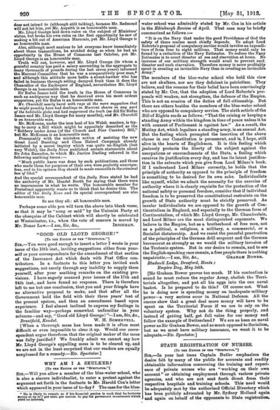WHY AM I A SICIILKER P [To THE EDITOR OF
THE "SPECTATOR."] Sin,—Will you allow a member of the blue-water school, who is also a sincere individualist, to enter a protest against the argument set forth in the footnote to Mr. Harold Cox's letter which appeared in your issue of to-day P The case for the blue-
• He is likely to remain so if his financial genius is such that he borrows money at up to 7 per cent, per annum to pay for permanent investments which yield no interest,
water school was admirably stated by Mr. Cox in his article in the Edinburgh Review of April. That case may be briefly summarized as follows "It is on the Navy that under the good Providence of God the safety of these realms most chiefly depends. To adopt Lord Roberts's proposal of compulsory service would involve an expendi- ture of from four to eight millions. That money could only be found by a reduction of the Navy Estimates. To reduce the Navy Estimates is to court disaster at sea and starvation at home. No increase of our military strength would avail to prevent suet disaster and such starvation. Therefore money is more profitably spent in creating an invincible Navy than in creating an invincible
Army."
The members of the blue-water school who hold this view are not skulkers, nor are they deficient in patriotism. They believe, and the reasons for their belief have been convincingly stated by Mr. Cox, that the adoption of Lord Roberts's pro- posals will weaken, not strengthen, the defence of the Empire. This is not an evasion of the duties of full citizenship. But there are others besides the members of the blue-water school who are opposed to compulsory service. The sixth article of the Bill of Rights reads as follows: "That the raising or keeping a standing Army within the kingdom in time of peace unless it be with consent of Parliament is against law." As a result, the Mutiny Act, which legalizes a standing army, is an annual Act. But the feeling which prompted the insertion of the above clause in our Constitution is permanent, and is, I hope, still alive in the hearts of Englishmen. It is this feeling which jealously protects the liberty of the subject against the usurpations or encroachments of the State, a feeling which receives its justification every day, and has its latest justifica- tion in the extracts which you give from Lord Milner's book. If I understand Lord Milner correctly, he holds that the principle of authority as opposed to the principle of freedom is something to be desired for its own sake. Individualists like myself, whilst we admit the necessity for the exercise of authority where it is clearly requisite for the protection of the national safety or personal freedom, consider that if individual freedom is to be preserved the constitutional restraints on the growth of State authority must be strictly preserved. As insular individualists we are opposed to the growth of Con- tinentalism in England, and especially to the German form of Continentalism, of which Mr. Lloyd George, Mr. Chamberlain, and Lord Milner are the most distinguished exponents. We believe in the Empire, but as a brotherhood of free men, not as a political, a religious, a military, a commercial, or a Socialist dictatorship. And we resist the peaceful penetration of the principles of the German drill sergeant and the German bureaucrat as strongly as we would the military invasion of the Teutonic system. But in our desire to remain, and to see the English-speaking race remain, a free people there is nothing
Studwell Lodge, Droxford, Hants Empire Day, May 24th.
[Sir Graham Bower proves too much. If his contention is sound he must reduce the regular Army, abolish the Terri- torials altogether, and put all his eggs into the one naval basket. Is he prepared to do this F Of course not. What he is doing now is spending money on inadequate military power—a very serious error in National Defence. All the omens show that a great deal more money will have to be spent on the Territorial Force if we are to rely on the voluntary system. Why not do the thing properly, and instead of getting half, get full value for our money and follow the example of Switzerland P We are as keen on naval power as Sir Graham Bower, and as much opposed to Socialism, but as we must have military insurance, we want it to be adequate.—ED. Spectator.]


















































 Previous page
Previous page